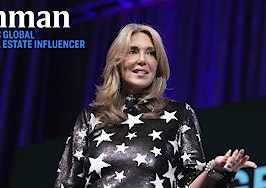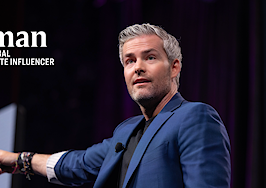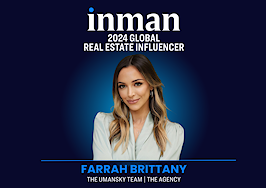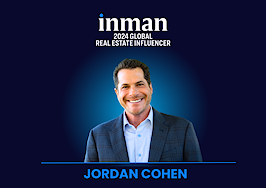At Inman Connect Las Vegas, July 30-Aug. 1 2024, the noise and misinformation will be banished, all your big questions will be answered, and new business opportunities will be revealed. Join us.
Chad Carroll never imagined as a kid that the work ethic he developed playing 12 hours of golf per day would one day translate into him becoming one of the top real estate agents in the country.
Today, Carroll consistently ranks as the No. 1 agent for Compass Florida, is numbered among the top 1 percent of agents nationwide and leads his own luxury team of about 45 agents and staff.
He has also been named to the second annual class of Inman Influencers and boasts 487,000 followers on Instagram.
“I was very, very competitive,” Carroll said of his youth spent devoted to golf. “And I think that’s what made me a very good businessman and taught me good work ethic, dedication, structure, etcetera.”
Without having role models in his family for how to carry out a real estate career, Carroll largely forged his own path, leaning heavily on the hard work and dedication he had cultivated his entire life.

Credit: Jeff Remas
Cut from a different mold
Carroll grew up in a small town outside of Columbus, Ohio, called Bexley, where “everybody kind of knew each other,” he said.
Nearly his entire family was in the medical profession — Carroll’s grandfather was a doctor, as was his father. His mother was a nurse, and his sister grew up to be an ER doctor, while his brother became a dentist. But Carroll never really had an interest in medicine.
“I was kind of the black sheep,” he told Inman.
TAKE THE INMAN INTEL INDEX SURVEY FOR MAY
Drawn to athletics, Carroll became an avid golfer from a young age and threw everything he had into the sport.
“I was traveling around almost every single week to different tournaments around the country,” Carroll explained.
When he attended university at Florida Southern College, Carroll continued to play golf and at first had hopes of going pro. But once he started competing at that level, Carroll realized that a career as a golfer might not be in the cards.
“When it comes to the professional level, you really need to have that natural talent,” he told Inman. “And I just didn’t feel that I had that.”
Carroll decided to transfer to Hofstra University in Long Island and closed out his undergraduate career with a degree in marketing and business management. After graduating, he had a short stint doing marketing for an aerospace defense company in the area and then decided to move back to Florida to work in commercial real estate at the suggestion of a friend’s dad, who worked in the industry and saw Carroll’s potential.
“He is a major, major player in the commercial world,” Carroll said of the man who became a role model to him. “He owns about 350 or 400 shopping centers around the country, and I always looked up to him as a business mentor. He thought I had what it took to get into the real estate sector, and so I followed his lead. Thankfully, that led me to the residential world, which I figured out on my own, and here we are today.”

Credit: Jeff Remas
Launching a career at a difficult time
Carroll got into residential real estate around 2009, right after the Great Recession had hit and the market was at bottom.
But instead of being discouraged about the overall state of the market or his odds going into an industry that, at the time, didn’t look very optimistic, Carroll turned what could have been seen as a negative situation into an opportunity.
“It was a very, very bad time in the marketplace, right after the recession,” Carroll said. “But, my expenses were low, and it allowed me to really focus in on learning the market and the players backward and forward so that, when the market turned around, I was there to take advantage of it.”
During those early years, Carroll faced a lot of letdowns, he said. But he never let those disappointments break him.
“There were many deals I was working on that just did not come to fruition,” Carroll said. “I learned how to manage my emotions throughout those experiences and really dial it down and take those missed opportunities as lessons and learn from them and become a better agent because of that.”
Carroll would study the situation in hindsight and ask himself questions like What could I have done differently? How can I improve? Are there things in the future that I could do that could have made me seal that deal? Or was it a lost cause?
Carroll adjusted his mindset each time to see the positives in the negative, and when he did close a deal, he reinvested his profits into the business. He also used his golf training as a model to set daily, weekly and monthly goals.
For the first six to seven years of his business, Carroll reinvested his profits to the point where he was ultimately spending $1 million-plus per year on marketing.

Credit: Justin Mein
Growing a team
Around year five of his business, Carroll realized he could do much more with a team surrounding him.
“I realized that having a team was so beneficial,” Carroll said. “That you could cover more areas than just one little sector, and that we weren’t limiting ourselves to one little area.”
“Then on top of that, I realized that I was turning into a really killer agent and wanted to help other people become the same caliber of agent,” he added.
Several of Carroll’s teammates have been with him now for close to 10 years, he said.
“And they’re growing every year, year-over-year, and it’s really an amazing thing to watch. That was my goal — just create a bunch of killer agents with great work ethic and attention to detail.”
The team specializes in South Florida’s ultra-high-end market and has broken records in Miami-Dade, Broward and Palm Beach Counties.
“We’re always striving to do better, to gain more market share in different areas and do the best job we can for our clients,” Carroll said.
In the near future, Carroll said he hopes to continue growing the team and its market share in a “very positive way.” The team plans to expand into more markets throughout Florida, New York, the West Coast and Chicago in upcoming years.
“I want to mentor more people individually and show them how to compete at the high end of the market; show them what it takes,” Carroll told Inman. “Because I think a lot of people say they want to do it, but they don’t understand what it really takes, day in and day out, to compete at that level. It’s very easy to do one sale, but to stay at the top is a challenge, and I think I know how to navigate that system very well and would like to teach more people how to do that.”

Credit: Justin Mein
Social media
Wielding social media in his business has helped Carroll reach potential high-end clients all over the world, he told Inman. It has also helped shape the team, in one way, to meet demand.
“We’ve closed countless transactions with people [who speak] other languages,” Carroll said. “Spanish, Portuguese, Russian, Hebrew, you name it. That’s one of the things that I noticed [through social media engagement] and we started to incorporate within the team. We’ve got Russian-speaking, Portuguese, Spanish, and all these [agents who speak] different languages so we can facilitate these transactions in a much smoother way. We try to meet the client’s expectations of having a native language speaker, and it’s really helped our business dramatically.”
In addition to connecting with new and established clients, Carroll said he sees social media as a valuable motivational tool that can help other agents reach new heights, particularly when they learn how he had to make his own way in the industry, but today is one of the top agents in the country.
“I have people reaching out to me every single day saying, ‘Teach me the ropes. Tell me what you did and how you did it.'” Carroll said. “And a lot of these random people that follow me, I’ll respond to and give advice to them.”
Maintaining transparency
In addition to his work ethic, Carroll says his other secret to success is being completely transparent with clients and not giving in to what he knows they want to hear.
“It sounds great, but that’s not the reality,” Carroll said of other agents who appease their clients, even if they know it will make things more difficult in the long run. “Most of the time, you have to show them what the reality is today and explain to them why it is that way and what you can do for them. So I don’t ever over-promise. I like to set expectations the right way and over-perform.”












